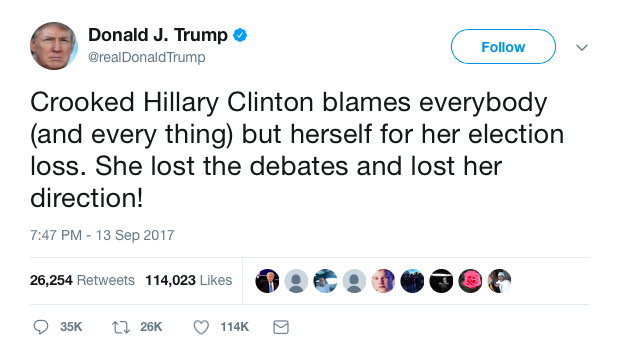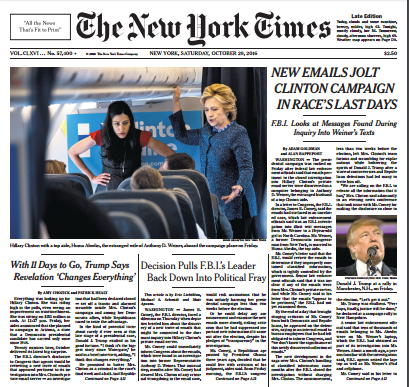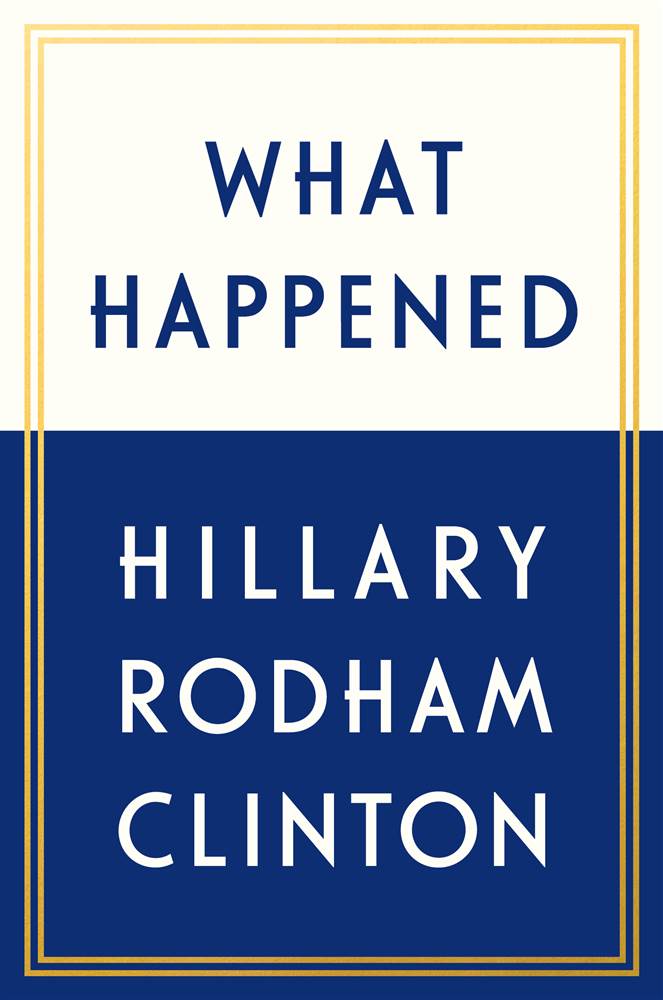She’s back.
She’s that person who just can’t seem to please everyone: some people adore her, but others will never be satisfied by anything she does. To her fans she’s a cultural icon, a symbol of empowerment for women. To her critics, she’s nothing special; she’s just in it for the fame, power and money.
In the spotlight again, she’s back making an edgy, illuminating statement steeped in self-awareness, a desire to settle some old scores, and a defiant attempt to rekindle her reputation.
“Haters gonna hate,” as she would say – but never mind. With record-breaking sales, she still gets something of a last laugh with her latest release.
That’s probably enough about Taylor Swift.
Forgive me, but I couldn’t resist making the parallel between these two women. Released within the space of a month, Swift’s ‘Look What You Made Me Do’ and Hillary Clinton’s What Happened both strike a certain rawness in (vastly) different ways. Both express the same fundamental message: “This is me. Take it or leave it. I’m not sure if I really care anymore.”
Before turning properly to What Happened, I should say something from the outset. I’m firmly in that category that actually likes Hillary Clinton – and I’ve been in it for some time (if you’re looking for an objective, detached review of her book, let me know if you find one).
I’ve long admired her as a strong, smart woman who wants to get things done. More deeply, I admire her as a fellow introvert. That word in itself, of course, seems to connote something ‘bad’. As Susan Cain puts it in her book Quiet, there is a cultural bias against introverts. Their typical personality traits aren’t always very well understood or appreciated in cultures where extroversion seems to be more ‘normal’.
Introverts … may have strong social skills and enjoy parties and business meetings, but after a while wish they were home in their pyjamas. They prefer to devote their social energies to close friends, colleagues, and family. They listen more than they talk, think before they speak, and often feel as if they express themselves better in writing than in conversation. They tend to dislike conflict. Many have a horror of small talk, but enjoy deep discussions.
In other words, introverts can have many fine qualities for leadership and governing, excited by the nitty-gritty details of policy, prepared for the seriousness of public service. But when it comes to the retail politics of reaching public office, different qualities tend to be required.
The circus of a modern presidential campaign is pretty much an introvert’s worst nightmare, drawn out over the best part of two years. Hillary Clinton decided that the prize was worth the pain, but she failed to reach it. I still believe that she would have made a terrific president, but there’s no escaping the fact that the campaign to get her there just didn’t work in 2016.
So, what happened?
The less generous reviews of Hillary Clinton’s electoral post-mortem claim that she “blames everyone else for her defeat.” Unsurprisingly, this verdict was handed down by President Trump himself. It’s easy to arrive at this conclusion – if you choose to avoid reading the 464 pages of Clinton’s take on the election.

These dismissals miss the point. In her account, Clinton displays a healthy dose of self-awareness, but not self-doubt – she knows all-too-well her weaknesses as a candidate, but yet can’t let go of her belief that she would have made a very good president. Haunted by the knowledge of the man who beat her, there are plenty of moments when she accepts personal responsibility for defeat.
She thinks back to her childhood when she used to tease her dad’s claim that he would always love her, no matter what.
Once or twice last November, I thought to myself, ‘Well, Dad, what if I lose an election that I should have won and let an unqualified bully become President of the United States? Would you still love me then?’
She knows that she bears responsibility for Donald Trump’s victory. Does she bear sole responsibility? No. In any analysis of what went wrong for her in 2016, five themes become hard to ignore.
1. She’s ‘Hillary’.
With near-universal name recognition, Hillary Clinton can’t reinvent herself to the American electorate. She can only re-introduce herself. But there remains this sense that people don’t actually know her. Is she authentic? “Who are you really?” she frequently got asked by reporters. After plenty of years under attack in the public spotlight, coupled with an introverted personality, she was accustomed to keeping her guard up. Read the book to remind yourself as to just how ridiculous some of these attacks truly were, and ask yourself whether you would have responded with such grit and control.
Still, there’s no denying that my cautiousness has had the effect of making some people feel like they weren’t getting the unvarnished me, which in turn prompted the question, ‘What is she hiding?’ This frustrated me to no end, and I never figured out how to solve it.
As a woman, she faced compounding challenges. She adapted her speech to try and avoid ‘screeching’ and wore trademark ‘pantsuits’ so that people might talk about what she says rather than what she’s wearing. Yet, fundamentally, holding an ambition to govern still seemed to arouse suspicion, not admiration.
2. Policy and pragmatism aren’t for everyone.
“For me, political campaigns have always been something to get through in order to govern, which is the real prize,” she admits. She also admits that she’s a fervent policy wonk who enjoys ‘sweating the details’, and always has been since the start of her legal career.
Some of the most poignant moments in What Happened are the times Clinton describes meeting people one-on-one. We know that the big rallies are to be endured, not enjoyed. Whether she’s talking about meeting mothers in Chicago who have lost their children to gun violence, attending a town hall meeting in New Hampshire where locals are confronted with a horrific opioid endemic, or visiting the mainly African-American town of Flint where water has been poisoned with lead, you get a sense that she cares more about these things – and how to fix them – than getting the approval of pundits on Fox and Friends.
It’s easy to get a sense of her frustration with Trump – for his obvious lack of appreciation for any policy detail. So too is it easy to sense her frustration with her Democratic rival Bernie Sanders – for dismissing pragmatic realities and paving the way for Trump to tap into the ‘Cooked Hillary’ mantra. She cites a Facebook post to capture this frustration:
BERNIE: I think America should get a pony.
HILLARY: How will you pay for the pony? Where will the pony come from? How will you get Congress to agree to the pony?
BERNIE: Hillary thinks America doesn’t deserve a pony.
BERNIE SUPPORTERS: Hillary hates ponies!
HILLARY: Actually, I love ponies.
BERNIE SUPPORTERS: She changed her position on ponies! #WhichHillary? #WitchHillary
DEBATE MODERATOR: Hillary, how do you feel when people say you lie about ponies?
WEBSITE HEADLINE: “Congressioonal Inquiry into Clinton’s Pony Lies”
TWITTER TRENDING: #ponygate
“I’m a progressive, but I’m a progressive who likes to get things done,” Clinton recalls one of her lines from a primary debate. It sums up her attention to policy goals – and her pragmatic approach to delivering them.
3. The media.
It’s Trump, of course, who most vocally bemoans ‘Fake News!’ and the biased media. He’s almost always wrong about what constitutes ‘fake news’, but he’s usually right to say that the media are biased against him when it comes to the framing of reporting.
When it comes to the content of reporting, Trump had the easier time in the run-up to the election. Citing a study from Harvard’s Shorenstain Center, public policy discussion constituted 10% of all news coverage before the election. Controversy over Clinton’s emails dominated, and received far more sustained attention than any of Trump’s ‘scandals’.

The cover of The New York Times, 29 October 2016.
She lays particular responsibility with the New York Times (ironically the same outlet that has become a frequent target of derision from Trump).
In 2015 it was the Times that first ran the emails story with the headline, “Hillary Clinton Used Personal Email Account at State Dept., Possibly Breaking Rules.” Clinton notes that the Inspector General at the State Department (responsible for enforcing the Department’s rules), found that she had broken no rules. She also notes that it wasn’t until the eighth paragraph in the article that noted, “Mrs Clinton is not the first government official – or first Secretary of State – to use a personal email account on which to conduct official business.”
Over a year later, and just a matter of days before Election Day, it was the Times that both headlined with James Comey’s new announcement over the emails (which ultimately found nothing), and reported that the FBI saw no link between the Trump campaign and Russia (when there was an ongoing investigation into precisely this).
Clinton says that she still reads the Times every day and values its journalism, at least its “non-Clinton reporting.” But she clearly thinks that news coverage from it and other outlets helped to reduce voters’ trust in her and, in turn, influence the outcome of the election.
4. ‘Those damn emails’ – and James Comey.
Imagine you’re a kid sitting in history class thirty years from now learning about the 2016 presidential election, which brought to power the least experienced, least knowledgable, least competent President our country has ever had. Something must have gone horribly wrong, you think. Then you hear that one issue dominated press coverage and public debate in that race more than any other. “Climate change?” you ask. “Health care?” “No,” your teacher responds. “Emails.”
If you’re being completely honest, do you know what the big deal was about Hillary Clinton’s emails? It seems to me that it all came down to her being able to keep her single Blackberry, access all her email accounts on it, and not having to carry two phones. It wasn’t a great idea – as Clinton admits.
No matter how many times she apologised or explained it all, it never seemed to work. “I never found the right words. … At times I thought I must be going crazy. Other times, I thought it was the world that had gone nuts. … Mostly, I was furious at myself.”
She was, of course, cleared by the FBI of any criminal wrongdoing – twice. But if you think she’s grateful to the then director for saying so, think again. In his July 2016 press conference, he branded her “extremely careless,” against FBI protocols and without giving her the chance to respond. In his October 2016 letter to Congress he re-ignited the whole storm by revealing “the existence of emails that appear pertinent” – before a warrant had even been granted to screen the emails and discover that they were either duplicates of emails already examined, or simply personal messages.
After the saga, Comey defended his public revelations, saying he faced a choice between “speaking” and “concealing.” Clinton was clearly unmoved.
I can’t know what was in Comey’s head. I don’t know if he had anything against me personally, or if he thought I was going to win the election and worried that if he didn’t speak out he’d later be attacked by Republicans or his own agents. What I do know, though, is that when you’re the head of an agency as important as the FBI, you have to care a lot more about how things really are than how they look.
Was she too dismissive of the seriousness of the whole email saga, or was the whole thing blown out of proportion? Closing her thoughts on the controversy, Clinton says she imagines “future historians scratching their heads” as to how it gained the centrality it did in the 2016 election.
5. Russia.
Finally, there’s the murky spectre of Russia’s role in the election. This one goes to the heart of America’s democratic system. Here, Clinton lays out Vladimir Putin’s personal vendetta against her from her time as Secretary of State, and his desire to wreak havoc on western institutions. This, combined with Donald Trump’s “bromance” with Putin seemed to create a perfect storm.
It’s all pretty murky – it’s still the subject of a federal investigation, after all. But when it came to the hacking of the servers of the Democratic National Committee and the subsequent drip-feed of these leaked emails by WikiLeaks, there are hallmarks of Russian involvement – and a motive.
Clinton refers to the episode, exacerbated by social media, trolls and fake bots, as a ‘War on Truth’. She offers this reflection:
I know some will dismiss everything in this chapter as me trying to shift blame for my loss in 2016. That’s wrong. This is about the future. In the nineteenth century, nations fought two kinds of wars: on land and at sea. In the twentieth century, they expanded to the skies. In the twenty-first century, wars will increasingly be fought in cyberspace. Yet our President is too proud, too weak, or too shortsighted to face this threat head-on. No foreign power in modern history has attacked us with so few consequences, and that puts us all at risk.
The investigation continues. Whatever the outcome, this whole issue goes much deeper than Trump versus Clinton.
What’s next?
What will Hillary do next? Your guess is as good as mine, but one thing is fairly clear. When she turns 70 next month, she’s not going to ‘stay at home and bake cookies’. When she gave the commencement address as a 21-year-old at Wellesley College in 1969, she told her peers to “get caught trying.”
This is not a woman who sits back. This doesn’t mean she’s going to run again. I felt exhausted at times just reading her description of some of the trials and tribulations of her 2016 campaign. She now has a blank space; however she decides to channel her energy and ideas, it won’t be a spur-of-the-moment reaction.
It’s no accident that the chapter titles evolve from ‘Grit and Gratitude’ to wind up on ‘Love and Kindness’. Some will regard the whole point of the book as less a diagnosis of what went wrong in 2016 and more a rallying call. Still, there will be plenty of readers who will never like, let alone ‘get’, Hillary Clinton. There will be even more non-readers who can imagine nothing worse than spending time and money on what they will presume to be yesterday’s vengeful woman indulging in self-pity.
Me? I like her even more.
 What Happened (2017) is published by Simon & Schuster.
What Happened (2017) is published by Simon & Schuster.
Also published on Medium.
